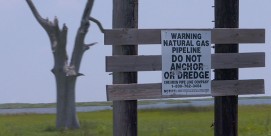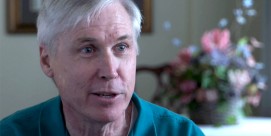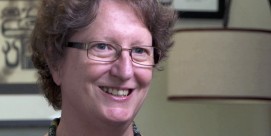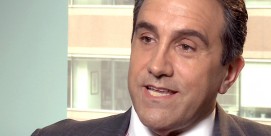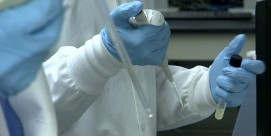In This Episode << SLIDE LEFT TO SEE ADDITIONAL SEGMENTS
E.O. Wilson Extended Interview
Read more of Bob Abernethy’s October 16, 2006 interview in Cambridge, Massachusetts with E.O. Wilson:
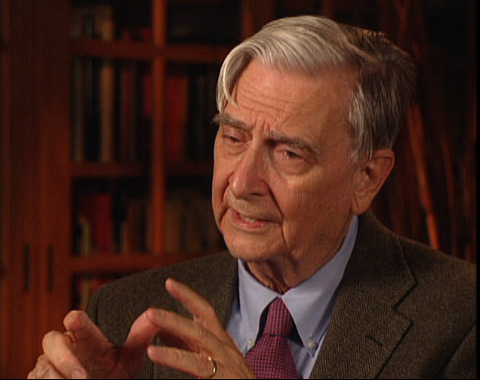 Q: As briefly and as strongly as you can put it, what do you want all of us to do?
Q: As briefly and as strongly as you can put it, what do you want all of us to do?
A: I want us to save the creation. Not just care about it, but save it. A large percentage of the Earth’s ecosystems and the species that live in them are endangered, and many will go extinct unless we take proper action.
Q: How serious is this threat of destruction? You have made some calculations and estimates about what percentage of existing species might be lost in some period of time.
A: It might be best to preface that by saying that the official list, which has been gone over species by species by experts, has something like 40 percent of the fresh water fish species in the world at some degree of risk, and about 25 percent, very roughly, of the frogs and other amphibians and reptiles and things of that sort, and 12 percent of the birds, and they are at sufficient risk so that most specialists on biological diversity would agree that as many as one-half of the species of plants and animals on Earth will be gone by the end of this century if we don’t do something.
Q: What if they disappear?
A: In very brief summary, what we will lose would have otherwise been incalculable value to future generations — well, to our own generation — in scientific knowledge, in potential new products, including pharmaceuticals that can be discovered in these species. We will lose enormous value and ecological services. It’s been estimated that the wild creatures of the world, the ecosystems they form, provide roughly $30 trillion worth of services scot-free to humanity every year. But to come quickly to the issues that I have most recently brought up, we will have severe spiritual loss, and we ought to also have for all generations to come, if we don’t do something about it, a bad conscience for having allowed the world biodiversity, and I will also call it “the Creation,” to disappear.
Q: You say severe spiritual loss. What do you mean by that?
A: The rest of life is important for humanity. It’s important not only for our day-to-day welfare and for our potential to manage a healthful life for humanity, but it is important for our psychological well-being. Psychologists have now established that probably due to the fact that humanity has lived in the midst of wild nature and came into being in wild nature’s environment that we are hard-wired to a very substantial degree to respond to it in particular wars, and to gain a sense of security, of depths of relationship, on occasion a sense of unlimited frontiers to explore, and the sense of our own worth. It’s a mix that, put together, produces spirituality.
Q: I can imagine someone saying that we have a growing population. We need to expand out into more and more farmland. From your perspective, that means destroying the natural habitat. Wouldn’t a lot of people think there was more practical value in growth and more economic prosperity than there would be — that that would be more important than protection of the species?
A: Well, let me put it this way, and with a metaphor, with a parable, so to speak. It would be a more immediate practical value to the French people to sell off all of the contents of the Louvre, take the money and put it into, well, whatever. But that would be very short-term, would it not, in terms of what would be yielded in money and income and perhaps comfort? But consider, too, it would be even greater practical value to burn it and use it for fuel. But, of course, the value of that would only last a matter of a few hours.
Q: What I’m trying to get at is the extent to which we are threatened by the loss of all these species. A: We are threatened by their loss.
Q: Why?
A: We are threatened by the immense loss that it entails of future scientific knowledge, future products that could enrich humanity and help stabilize our economies and give us a higher quality of life. We would be at severe loss, and you can measure it in dollars, of the ecosystem services, like the cleaning of water, the maintenance of water systems, pollination and so on that these wild systems provide for us. But the loss that I care about most is in spiritual enrichment, in living in this magnificent original environment in which humanity was born.
Q: What might be lost unless we act? What are the figures?
A: We know 1.8 million species of plants and animals and microorganisms today. We know them enough to classify them and identify them. The actual number is perhaps ten million, I think at least ten million, but when you include the microorganisms, it could go to a hundred million.
Q: We’re not conscious, most of us, of all these species on which you say we depend.
A: I don’t say it. It’s a fact that we depend on balanced, harmonious ecosystems for our lives.
Q: If we continue on the road we’re going, then, are we at risk of going hungry?
A: Let’s put it this way. Eventually yes, but I think the long-term loss would be the pauperization of the Earth. We’d get along, but it would just be a far poorer, less stable Earth. You know, I wish you would ask me the following question: Should we really be giving up fertile land and reducing our agricultural output worldwide and other resource output to save this species?
Q: Consider it asked.
A: Okay. In fact, the good news part of all of this big issue of the living environment and its conservation is that if we use our science, if we use common sense, we can actually increase the productivity of the world while saving all of the, or most of the remaining species. And we can do it in part by studying and making use of the resources of new food crops, new genes that can improve existing crop productivity, and furthermore the restoration for agricultural purposes of parts of the world that have become wasteland. But there’s another reason why this is such a foolish equation to draw, you know, between development versus conservation, and that is that we now know that something like one-half of the plant species of the world and perhaps 40 percent, very roughly, of the best known groups of animals, you know, like birds, mammals, and reptiles, are found on the land at least, and only about two and a half percent of the land surface. We call these the hotspots; the scientists have got them identified and mapped to some extent. We know how to save or at least throw an initial umbrella over a large part of the rest of life, including some of the most endangered species of ecosystems, by saving only two and a half percent of the land surface of the world. And if you throw in, in addition, chunks of the tropical forest wildernesses in the Congo and the Amazon and New Guinea — those wouldn’t be terribly expensive to acquire — you’re getting up to about 70 percent of the known species.
Q: What would it cost to preserve that much of the Earth’s surface?
A: The latter figure, one that covers as much as 70 percent, would cost, if ideally applied — and, of course, you know this, a lot of this has got to be political, economic planning and the like — would cost one payment of about $30 billion. Now $30 billion is a lot of money, you know, when you just say the word, but it’s worth pointing out that that’s only one part in a thousand of the world domestic product. In other words, humanity — and all of the countries in the world — has its annual domestic product combined of about $30 trillion, so that a $30 billion cost to save a very large part of the rest of life, one thousandth of that, now this seems to me, and I’ve never been rebutted on that, to be the best bargain ever offered humanity. Another way of putting the figures that have been worked out by teams of biologists and economists is that $30 billion would save, at least for a while, would throw an umbrella over some 70 percent of the known species living on the land.
Q: And what about people in this country? Suppose we took seriously what you propose. Would it require that we lower our standard of living, and if so, how much?
A: It would increase our standard of living if we did it sensibly. It would mean that we would now include in our programs of scientific and technological advance the methods to make far better use of already cultivated land, other natural resources that we have of alternative energy sources, all those things, you know, that we now are waking up to as crucial to our future, quite apart from the living environment from the creation. We move in that direction, and then include in it the goal to take through with us, through this bottleneck that we’re in right now of overpopulation and over-consumption, gross consumption, to take through as much of the rest of life and creation as we can until we can get on better footing economically and environmentally. Then this would be worth tremendous amount of effort on our part as a country and the world at large.
Q: How much would population growth have to be reduced in order to accomplish what you want?
A: You know, the question is moot, because we already know that the population is slowing down; growth is slowing down fast. Right now we are at a point of somewhere around an average worldwide of three children per woman, fertility worldwide. And that is down to about half of what it was 40 years ago or so. It turns out that women get a little more freedom, a little more security, more independence, and more control over their own reproduction virtually everywhere in the world, they reduce the number of children they have. They want a small number of quality children. It’s as simple as that. So, it’s been estimated that due to this downward trend of fertility, we will peak worldwide at a population of somewhere around 9 billion, and that’s, say, roughly 40 percent more than are on the earth today. That’s manageable.
Q: What about the implications for government power? The kinds of things that would have to be done, it seems, require a certain amount of coercion on the part of the state, no?
A: No, sir. In a free, capitalist, competitive democracy like the United States, it only requires markets, some boosting markets, some kind of encouragement, and that can come about by two means. One, and foremost, is public awareness. As the public becomes better informed about what the world and America’s environmental problems are, and therefore can see things in personal, human self-interest, then they will begin to ask questions of how we can accomplish this. And when they see the role that biodiversity plays in the stability of the world and how valuable it can be in every respect to us now and the future generations, then we will get a bottom-up pulse of opinion that can push it, expressed in the marketplace, expressed in the polls and voting booths. The other way is — and this has to come about as part of the political process — we should put subsidies on those kinds of scientific and technological advances. We have all kinds of subsidies already; most of them are to pursue what often are ruinous environmental practices, you know, such as the fisheries, at least in the past. And now we need to be able to encourage industry and technological innovators to move in the direction of producing a better world with material and energy consumption and conservation of the rest of life.
Q: I’d like to take you through some of what I imagine to be the objections of a Southern Baptist pastor, the kind of person to whom you have addressed your book. You’re speaking from the point of view of someone who was long ago convinced that evolution and natural selection are the way we all got to be the way we are. I can imagine someone who would say Genesis doesn’t say that. Genesis says God created everything in six days.
A: That’s precisely why I wrote THE CREATION. I put my cards face up on the table as a biologist who indeed has spent his life working on evolution and is convinced of its reality. But then, having expressed my own personal beliefs very frankly, including my secularist interpretation of the position of humanity and the universe, I offer a hand of friendship. That’s something I don’t think any natural scientist of my acquaintance has ever done, particularly when they start arguing about these issues. And that’s why I address the Southern Baptist pastor. He stands in for the evangelicals, who stand in for religious believers who have that moral view, generally: Pastor, we need your help, and it doesn’t matter what either one of us, or any of us, believe about how it got there. The creation is there. It’s the glory of the Earth. It’s the treasure house and the responsibility of humanity. Let’s see if we can’t get together on saving it as common ground in a good American tradition, and if we did, because science and religion are the most powerful social forces on Earth, we could do it. It would be a wonderful way to get together and put the best of what we have, your commitment, your religious passion, your beliefs put to a good purpose, and the scientists’ passion, based on secular knowledge, scientific knowledge — I mean, that’s what we do. That’s our business is to find out all these facts, put them together, and solve the problem.
Q: There are people who claim that evolution is not yet proven.
A: I think they’re wrong. I think the evidence is overwhelming. But that said, I don’t think that should be a serious stumbling block even in terms of the cooperation of religious [communities] and environmentalists and scientific researchers at all, because we can find, I think, common ground without settling that argument. I want to put aside the culture wars. I want to call a truce on the culture wars. Or if they continue to be conducted, I’d like to have them conduct this on a different battlefield. I want to see these differences in worldview acknowledged but then put aside, or at least that the culture wars, as they’ve been conducted recently, occur on a different battlefield. It can be simultaneously, but I want to join on another terrain that in the long-term I believe will prove to be more important for humanity to solve this other big problem.
Q: Some people say history is going to come to an end very soon. The end times are approaching, perhaps within our lifetime, so why do we have to worry about all these species? We’ve got better things to think about.
A: On the matter of end time, I know a lot of people believe in it, especially within the evangelical movement. But it comes down to really a matter of time, doesn’t it? There are some who believe that it is upon us, that it will occur in our lifetimes, it could occur within a few weeks, and so on. But I think the majority of Christians and possibly a majority of evangelicals don’t believe that it’s coming that quickly. If you accept it — as a secularist I wouldn’t, but let’s say you accept it, that it’s coming. Then it really is a matter of how long it is off. Even if it’s a short time off, I believe that the Bible was quite plain, and that common sense makes it compelling, and that everything that is human that we feel as human should make it a precept of our morality that we take care of the creation. An evangelical leader, I think it was Billy Graham, but certainly one of that fame and caliber, said not long ago that just because we’re stewards of the Earth doesn’t mean that we should be trashing it.
Q: There’s a line in your book: “Pastor, tell me this is not true.” You were referring to this idea that we don’t have to take care of the Earth because it’s all going to end very soon, and you said that was a gospel of cruelty and despair.
A: A very small majority of Christians, and maybe a small majority even among the born-again Christians, believe that the Rapture, that is, the bodiless asset of those born again, saved by the Redeemer, will occur very quickly, very soon, in our lifetime, and that therefore there isn’t a lot of value in paying any attention to what we do to the Earth. We could go ahead and tear it all to hell and back and make whatever use of it we want, because it’s been given to us sort of like a Christmas present to be unwrapped and used by the Creator. I do consider that, frankly, as a gospel of despair, of pessimism, a view of humanity and our place on this Earth that is indefensible.
Q: And some people might say don’t worry too much about it. Human beings are resourceful. Some of them are brilliant, and human genius will get us out of this.
A: Yes. I’ve faced the argument many times. That comes from the other extreme. Now we’re departing from the religious as such, and now we’re going over to what can be called techno-mania, and that is an unlimited faith in human potential to solve our problems, including of our own making. No matter how serious they are, we’ve always been ingenious. We’ve always figured out some way of replacing things we threw away, of restoring things we destroyed, of finding new sources of strength and energy. So we’ll just rely on human genius, we’ll rely on science, and we’ll rely on technology to pull us out, no matter how badly we screw up. So it’s okay to just plow full ahead and have total faith in humanity’s ability to adapt to all changing conditions. You might say that’s a kind of secularist extremism way at the opposite side of the pole of those in the evangelical movement who say it doesn’t matter what we do to the Earth, we will be provided for by God.
Q: Do you think human genius could solve it?
A: Well, let me put it this way. Can human genius solve all problems of our own making as we are totally reckless about how we handle our own environment? I think there are lots of situations that could be imagined in which no amount of human genius can solve the problems. If you chose to take a nose dive off a ten-story building, we can’t do anything for you. We’re just not that brilliant.
Q: Back to the imagined Southern Baptist pastor. What arguments would you put to him that you would want him to answer?
A: I think straight talk. In fact, what I’ve done in THE CREATION is to say, and the key to this is respect, deference, and a willingness to ask for help from the secularists, particularly the secular- based scientists and environmentalists, and to say, particularly in my case I could say I know the evangelical culture. I know the Bible. There’s a lot for me to learn. I’d like to learn more. I’d like to learn more about the worldview of Judeo-Christianity and particularly evangelicalism. But now I’d like to take you on a tour through my world and tell you how I see modern biology, where it is today, where it’s going, what the problems are that we’ve revealed concerning the environment and the like. So that’s the first thing I say to my new friend, the Southern Baptist pastor, and then I say, “You know, I’m not in a position to tell you this, but I would be so heartened if you agreed that there’s common ground and that somehow what I could lay before you, and my colleagues, you know, in science and environmental work — we lay before you something that you see as worthy of your ministry.”
Q: Isn’t the idea of stewardship strong in the Bible? Can it ever be interpreted to mean that God put us in charge and we can do anything we want with these lesser forms of life? And there is also plenty that says we have a responsibility to look after what God created.
A: Well, I’m not a biblical scholar. But I’ve read a lot in the Bible, and I grew up with it, and the feeling that I had from the very beginning was that the Bible preaches stewardship, that is, gives us responsibility. It gives us the rule of the Earth, the dominion of the Earth, but it also gives us responsibility, and it does not tell us really to transform everything into a cornfield, you know, to make everything just produce more people and more products to feed more people. There’s nothing in the Bible there that I’m aware of — I’m willing to stand corrected — but I go by Genesis and this magnificent command, I think it was on the fourth day of creation: “Let the waters be filled with countless living creatures, and let the birds fly above the Earth beneath the vault of the sky.”
Q: In one of your books it was widely interpreted that you were saying our behavior and everything about our lives was determined by our genes, much more than people at the time wanted to hear. You were the center of a lot of controversy, which eventually died down. But where do you stand now on that, on the extent to which we are the creatures of our genes and, on the other hand, we are shaped by our environment and by free will?
A: It’s a tough question to answer today, even though we know a great deal more about the relation between heredity and environment in shaping the human character, and by that I mean not just our individual traits as human beings, but the entire panoply of human nature. Thirty years ago, I published a book called SOCIOBIOLOGY and proposed that there is such a thing as human nature and that a lot of what we tend to do, what can be called instincts in humans, has a biological basis. The idea was very controversial. In fact, it was very substantially attacked. At that time, what was called a blank slate view of the brain was in almost complete control of the academic world, of social sciences. Marxists — that was their prayer book, the blank slate, because they believed at that time that humanity was entirely the product of culture and environment and that the brain came into existence, that is, in each human a blank slate on which experience inscribed our character. We know that’s not true now. The blank slate view disappeared rather quickly in the face of scientific evidence. But that evidence did not lead to the view of human beings as genetic automatons, you know, all determined and not in control of our own destiny. No, it led to something else. It led to a picture, and it’s getting clearer all the time, of humans as having a true nature that we all share, and that these are expressed in our emotions, and that they make some things easier for us to learn and other things very hard to learn. They make it certain that we’ll have strong emotions in different stages of our lives that make it almost compelling to do one thing as opposed to another. But it gives us enormous freedom in the way we do that and in the way we can control or enhance those traits that are hard-wired into our brain. I think that’s the basic idea today concerning the nature of human nature.
Q: Is one of the things that is hard-wired into us the idea that God exists?
A: Yes. Maybe not the Judeo-Christian God, but the idea that there are deities, there are supernatural forces in more elementary societies. These are sometimes just the spirits of the ancestors that are with us and wandering about and helping guide us, but the idea of supernatural guidance and empowerment of our tribe — notice tribe, not all of humanity, but particularly the group we belong to — I believe is hard-wired in us.
Q: Is there hard-wiring for the idea of there being something more than the material world?
A: Yes.
Q: Not just for the tribe but for all —
A: Yep.
Q: — for all human beings, something more that deep down we have a yearning for, experience of, and contact with?
A: I think that one of the deepest of human qualities hard-wired in the brain, if you wish, is the intense desire to belong to a group that shares important parts of its culture, and shares the sense of purpose larger than individual self, and shares, in the most cases it would be, a supernatural approbation and guidance and favor. In the case of secularists, we have the same types of grouping, culture formation, but now it comes and gets its expression as great goals of humanitarianism, a desire to learn as much about the universe as possible. But whatever form it takes, it seems to be fundamental to human beings.
Q: Can a person be both a good scientist and a person of religious faith?
A: Absolutely. I think that a person who is fundamentalist, to the extent of being a biblical literalist — you know, very strict interpretation of the actual words as sacred script and who denies that evolution ever occurred — is going to have trouble doing science in certain broad areas of biology. But otherwise I would say for those who accept that humanity came about by evolution, and that would include members of the Roman Catholic Church, for example, and most denominations, it is quite possible to have all the accoutrements of spirituality and believe in a deity.
Q: As a secular humanist, do you think everything can or will be explained by science?
A: No.
Q: Do you think that science can tell us everything there is to know about living?
A: I believe that science will, in the end — and remember science is not some body of entities that exists apart from humanity or from other belief systems; science is simply that body of knowledge from which we have gained some confidence by testing, by transparency, by logical connections to other bodies of science; [it] is the most democratic of all human activities, and it is one that’s widely shared, so let’s be clear on what science is. I would say that the scientific knowledge expanding still, almost at exponential rate, has already covered and given different explanations, and different world views apply, to a large part of what religion earlier appropriated to itself. But will science explain everything? No. We’re not that smart. Even with supercomputers, we’re not going to explain everything. There’s just too much complicated detail out there. We may get finally our unified theory of physics. We may come to understand in substantial detail how almost every species on Earth came into being and so on. But that’s still far from everything.
Q: Religious people often remind us that there are things like beauty and our appreciation of beauty. There are things like moral law. There are things like the religious impulse itself. I think a lot of people would argue that these are things science can never explain, because they are part of a spiritual reality that science doesn’t deal with.
A: I think science will explain a lot, particularly when neuroscience really reaches maturity as a science. But that does not degrade the matter whatsoever. If you explain the total physics of a violin, and you go to explain why the brain responds and what parts of it are responding and perhaps even some reasons, in terms of human survivability, we consider a particular piece of music beautiful, it doesn’t degrade the beauty of it. I think it enhances it, and that’s where science and the humanities and perhaps religion eventually will converge.
Q: Many people think it very important that there is a God who is separate from us, who makes his presence something we can experience in our daily lives, and that experience is of enormous value to people. The idea is that there is a spiritual realm to reality that is separate from the material. Do you acknowledge that?
A: Let me put it this way. I’m a good scientist. I’m not a hundred percent sure about anything, and I do have a kind of driving faith that humanity, having seized Promethean fire, so to speak, and found out how to understand the universe, will keep going until we will be able to explain things like the origin and the mechanics of spirituality. But that’s just a belief that I have, based on the track record of science. I do not believe, but this is a personal belief, that there is any sort of intercession, via divinity or other supernatural force, on human feeling, even the most exalting human feeling. But, as I said to my pastor, you could be wrong. I could be wrong. We may both be partly right.


